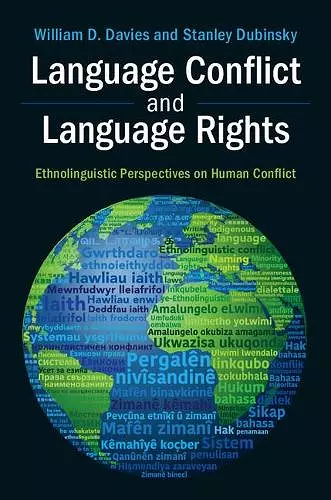Language Conflict and Language Rights
Ethnolinguistic Perspectives on Human Conflict
Stanley Dubinsky author William D Davies author
Format:Hardback
Publisher:Cambridge University Press
Published:9th Aug '18
Currently unavailable, currently targeted to be due back around 15th April 2025, but could change
This hardback is available in another edition too:
- Paperback£30.99(9781107606586)

An overview of language rights issues and language conflicts with detailed examination of many cases past and present around the world.
This introduction to ethnolinguistic conflict and language rights issues is designed both for linguists and for anyone interested in language's role in international and intranational relations. It offers a typology of conflicts and illustrative case studies, with particular attention to the role of language in individual, societal, and national identity.As the colonial hegemony of empire fades around the world, the role of language in ethnic conflict has become increasingly topical, as have issues concerning the right of speakers to choose and use their preferred language(s). Such rights are often asserted and defended in response to their being violated. The importance of understanding these events and issues, and their relationship to individual, ethnic, and national identity, is central to research and debate in a range of fields outside of, as well as within, linguistics. This book provides a clearly written introduction for linguists and non-specialists alike, presenting basic facts about the role of language in the formation of identity and the preservation of culture. It articulates and explores categories of conflict and language rights abuses through detailed presentation of illustrative case studies, and distills from these key cross-linguistic and cross-cultural generalizations.
'This book will be a delight to teach, learn from or just read. Davies and Dubinsky have given us an extremely useful introduction to the vast and topical field of language conflicts and language rights. After a review of basic notions in linguistic science for the non-professional reader, they take up the issues of identity, language rights in the context of human rights, and present a typology of language conflicts. These include indigenous minorities such as the Sami in Norway or the Ainu in Japan, geopolitical minorities like the Hungarians in Slovakia or Hispanics in Southwest US, migrating minorities such as the Roma in Europe and Puerto Ricans in the US, then intra-linguistic minorities like African American English speakers in the US, and finally, conflicts arising from competition for linguistic dominance are discussed in detail, e.g. Flemish vs. Walloons in Belgium and French vs. English in Canada. Carefully planned, well researched and reader-friendly, this textbook will be used profitably on any continent where university courses are offered on the life and death of human languages and the fate of their speakers.' Miklós Kontra, Károli Gáspár University, Budapest, Hungary
'What is lost linguistically when we lose a language? What is lost politically and culturally? William D. Davies and Stanley Dubinsky have written a very important book answering these crucial questions. It should be part of the library of linguists, anthropologists, psychologists, politicians and anyone interested in how our psyches are formed by language.' Daniel L. Everett, Dean of Arts and Sciences, Bentley University, Massachusetts, and author of How Language Began: The Story of Humanity's Greatest Invention and Don't Sleep There are Snakes: Life and Language in the Amazonian Jungle
'… this book is a first attempt to treat its topic in a comprehensive fashion for a linguistic audience, and the authors have already incorporated extensive material from both linguistic and nonlinguistic sources as part of their work. In that regard, this book should provide not only a useful text for courses on this topic but also a foundation for future investigation on the interplay between language, sociopolitical conflict, and human rights from a linguistic perspective. It is a welcome addition to available resources on this topic.' Jeff Good, Language
'… this welcome book covers tremendous empirical ground yet still coheres around a single, unifying theme: how language affects and is affected by human conflict. I know of no other book that addresses so many interesting issues while also remaining so accessible to a nonspecialist audience … I for one will be sure to assign this well-rounded, important, and insightful book to my own students.' Adam Roth Singerman, Language in Society
ISBN: 9781107022096
Dimensions: 235mm x 157mm x 25mm
Weight: 840g
446 pages